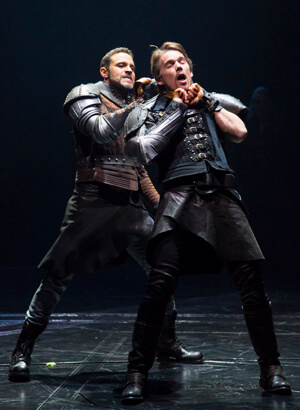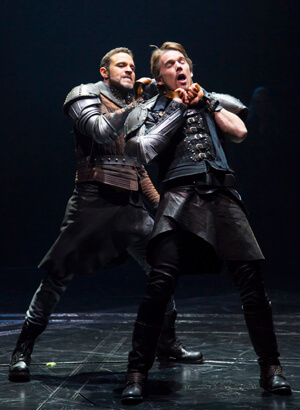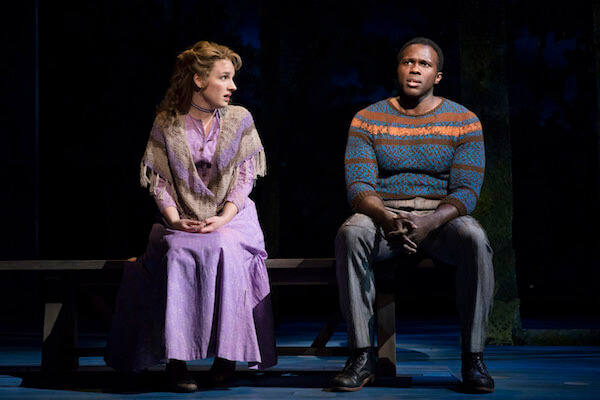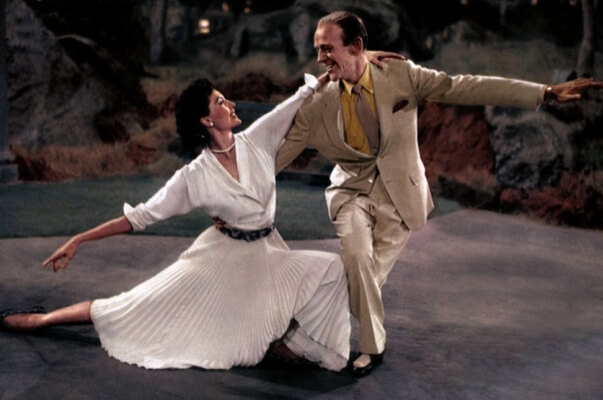Daniel Sunjata and Ethan Hawke in “Macbeth,” at Lincoln Center’s Vivian Beaumont Theater through January 12. | T. CHARLES ERICKSON
BY CHRISTOPHER BYRNE | Shakespeare as popular entertainment is getting a welcome bit of revival on Broadway at the moment. The magnificently hilarious “Twelfth Night” and the bombastic and unprecedented “Richard III,” both featuring Mark Rylance and an all-male company, strive to be as close to what Shakespeare’s audience might have seen. They blow away many more contemporary productions I’ve seen of either play.
Then there’s “Macbeth” at Lincoln Center, in a new staging by Jack O’Brien and featuring Ethan Hawke in the title role. Given the frequency with which this play has been staged lately — with at least one more production slated for next year — another production begs the question, “Why bother?”
Well, if for no other reason, it’s a pleasure to be reminded that at its heart, “Macbeth” is a ripping ghost story. It’s a tale of dark and supernatural powers and the ways such powers can corrupt otherwise moral men. To Shakespeare’s audiences in his time, this would have been both thrilling and terrifying, as belief in witches was by no means unknown. Modern audiences tend to see the Weird Sisters who set Macbeth on his murderous path as either metaphors for ego run rampant or mental illness. (The latter was the concept behind Alan Cummings’ production last year, which, ironically, was more ego run rampant than Shakespeare.)
Lack of focus, jumble of styles are the undoing of another “Macbeth”
In the current production, O’Brien has tried to split the difference between grand guignol and a contemporary reading — with decidedly mixed results. The staging is highly dramatic. Scott Pask’s looming set is spectacular, drawing inspiration from the expressionists. Japhy Weideman’s lighting is equally breathtaking, making as much use of darkness as of light and achieving a haunting theatricality throughout. Catherine Zuber’s costumes are, as always, cut perfectly, implying a classic period without being specific. There is heavy use of dark colors and leathers with occasional, dramatic flashes of color, such as gold in the coronation robes, that, as Henry IV says, “shine out like bright metal on sullen ground.”
Completing the concept’s high drama are the Weird Sisters, played by three men — John Glover, Malcolm Gets, and Byron Jennings. The male dynamic makes them appropriately scary, and one has no trouble believing that Glover, especially, could summon demons on a whim. The play’s design and the performances from these three actors coming so early in the play set a stylistic tone that O’Brien unfortunately abandons once the main plot begins to unfold.
The problem is that Ethan Hawke and Anne-Marie Duff as Macbeth and his Lady, respectively, appear to be in a different production of the play than the one unfolding around them. Hawke is an extraordinary actor, and his performance in “Clive” was a highlight of last season. However, his approach to Macbeth is much smaller and out of scale with the background action. He makes some interesting choices, particularly in moving from skepticism about predictions he will be king to conviction as the Weird Sisters’ prophecies begin to come true. Still, he underplays the moment in a way that could have been fascinating in a more intimate production.
Duff’s performance is largely unfocused, her motivations never clear in a given scene. Lady Macbeth’s sleepwalking scene, arguably one of the most famous in all of Shakespeare, evokes neither horror nor sympathy. Like much of the rest of her performance, it seems mechanical and filled with far too much contemporary sexuality.
Perhaps O’Brien was trying to create a distinction between the corporeal and supernatural worlds by placing naturalistic performances by Duff and Hawke at the center of the play, but the conceit, if that’s what it was, falls flat, as the action become larger and more dramatic.
Daniel Sunjata’s Macduff is huge, for example, and he fills the stage with his presence. Of course, he’s really the hero of the piece, and he carries it off with wonderful authority. Brian d’Arcy James is an affecting Banquo and delivers some of the show’s most compelling moments as his loyalty to Macbeth is repaid with his murder. Not so successful is Jonny Orsini as Malcolm. Outstanding in “The Nance” last season, Orsini is too contemporary and understated in the role.
While one roots for this production and its haunting design, the apparent lack of a clear directorial point of view ultimately undoes it. One has to be impressed by the effort, but the whole thing never really pulls together and, however reluctantly, gives up the ghost.
MACBETH | Vivian Beaumont Theater at Lincoln Center, 150 W. 65th St. | Through Jan. 12: Tue.-Sat. at 8 p.m.; Wed., Sat. at 2 p.m.; Sun. at 3 p.m. | $77-$157 at telecharge.com or 212-239-6200




































